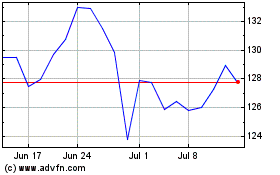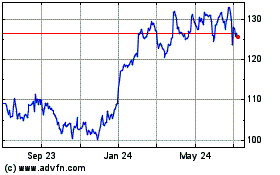Prisons Expand Hepatitis Treatment -- WSJ
March 10 2018 - 3:02AM
Dow Jones News
By Peter Loftus
This article is being republished as part of our daily
reproduction of WSJ.com articles that also appeared in the U.S.
print edition of The Wall Street Journal (March 10, 2018).
Massachusetts state prison officials agreed to expand treatment
for inmates with hepatitis C, in the first settlement among several
class-action lawsuits accusing state prison systems of denying many
prisoners access to costly drugs.
Drugmakers including Gilead Sciences Inc., AbbVie Inc. and Merck
& Co. since 2013 have been selling hepatitis C drugs with
higher cure rates than older drugs for the disease. But prices
initially were high -- between $54,000 and $95,000 per patient for
a standard course of treatment using drugs such as Merck's Zepatier
or Gilead's Sovaldi and Harvoni -- leading many state prison
systems to restrict their use.
Inmates in Indiana, Pennsylvania, Missouri, Minnesota and
Tennessee have filed lawsuits similar to the one in Massachusetts,
generally accusing prison officials of violating the U.S.
Constitution's Eighth Amendment prohibition on cruel and unusual
punishment by denying most infected prisoners access to the new
drugs.
Public-health experts say inmates have a higher hepatitis
C-infection rate than the general population because many have a
history of drug injection, a common route of transmission for the
blood-borne virus. The infection can damage the liver and become
life-threatening if left untreated.
Prison officials have said treating all infected inmates with
the new drugs would wreck their taxpayer-funded health-care
budgets. An analysis by The Wall Street Journal in 2016 found that
only 3.4% of inmates with hepatitis C in 34 state prison systems
had been treated with the new drugs.
Massachusetts has settled a lawsuit filed by two prisoners in
2015 accusing the state prison commissioner and a prison
health-care contractor of refusing to provide treatment to most of
the more than 1,500 inmates infected with hepatitis C at the time.
A judge certified the lawsuit as a class action on behalf of all
Massachusetts prisoners who couldn't get access to treatment.
The Massachusetts settlement requires the prison system's
health-care contractor to evaluate all infected prisoners and
prioritize treatment. It mandates that the sickest patients be
treated first with the new class of drugs. It also requires that
all new prisoners be tested for hepatitis C when they enter the
system.
About 280 Massachusetts prisoners -- those at more advanced
stages of disease -- are expected to be treated under the
settlement within the next 18 months with more to follow, said Joel
Thompson, attorney with Prisoners' Legal Services in Boston, which
represented the inmates who sued Massachusetts prison officials. At
least 130 inmates were previously treated, Mr. Thompson said.
Attorneys filed the settlement Friday in U.S. District Court in
Boston seeking approval by a federal judge.
Mr. Thompson said the settlement was a compromise. "We would
love to see everyone get treated tomorrow for hep-C, but in the
absence of that, what we wanted to see was a much more streamlined
system for triaging patients," he said in an interview. "The goal
is not to miss anybody, not to let it get to the point where people
are getting cirrhosis."
A spokeswoman for Massachusetts Gov. Charlie Baker called the
settlement "a fair and equitable resolution" that will improve
treatment of infected inmates.
The state's health-care contractor, Massachusetts Partnership
for Correctional Healthcare LLC, isn't a party to the settlement,
and the plaintiffs have agreed to dismiss the contractor from the
lawsuit once the settlement is approved by the judge. The
partnership is a division of Centurion, a joint venture of Centene
Corp. and MHM Services Inc. A spokesman for Centene, which recently
agreed to acquire MHM, couldn't immediately be reached.
Litigation is having an effect elsewhere. In a lawsuit filed by
Florida state prisoners last year, a federal judge in November
issued a preliminary injunction ordering the state corrections
department to substantially expand treatment of the estimated 7,500
inmates who have hepatitis C.
U.S. District Judge Mark Walker wrote in his ruling that Florida
inmates were dying because they weren't being treated, and the
primary reason for lack of treatment was lack of funding. The judge
issued an injunction to ensure inmates receive "medical care in a
timely manner consistent with constitutional requirements" and told
the state to avoid "further foot-dragging."
The Florida attorney general's office, representing the
secretary of the corrections department, said in court papers last
year that many prisoners with less advanced states of disease don't
need immediate treatment. The office also estimated it would cost
about $200 million in taxpayer money to treat all inmates known to
be infected, which the state called "an outrageous proposal."
As of Jan. 31, in response to the judge's order, the state
corrections department was treating about 230 Florida inmates, the
department said in a court filing. The judge has set deadlines for
treating or evaluating the rest.
A Florida corrections department spokeswoman said it is
committed to ensuring all inmates receive medically necessary
treatment and has asked the state legislature for additional
funding to expand hepatitis-C treatment.
Attorneys for inmates say cost isn't a defense. "You can't deny
them treatment despite the fact that it cost a lot of money, if
it's lifesaving," said Randall Berg, an attorney for Florida
prisoners who sued the state prison system.
Prices for the new drugs have been coming down. AbbVie
introduced a new hepatitis-C drug last year, Mavyret, with a list
price of $26,400 per patient for the most common treatment
duration. Drugmakers say discounts they provide on list prices have
made the drugs more affordable.
(END) Dow Jones Newswires
March 10, 2018 02:47 ET (07:47 GMT)
Copyright (c) 2018 Dow Jones & Company, Inc.
Merck (NYSE:MRK)
Historical Stock Chart
From Mar 2024 to Apr 2024

Merck (NYSE:MRK)
Historical Stock Chart
From Apr 2023 to Apr 2024
